2025年中考英语二轮复习:并列复合句和主从复合句课件(共26张PPT)
文档属性
| 名称 | 2025年中考英语二轮复习:并列复合句和主从复合句课件(共26张PPT) |  | |
| 格式 | pptx | ||
| 文件大小 | 133.2KB | ||
| 资源类型 | 教案 | ||
| 版本资源 | 人教新目标(Go for it)版 | ||
| 科目 | 英语 | ||
| 更新时间 | 2025-06-02 11:21:08 | ||
图片预览

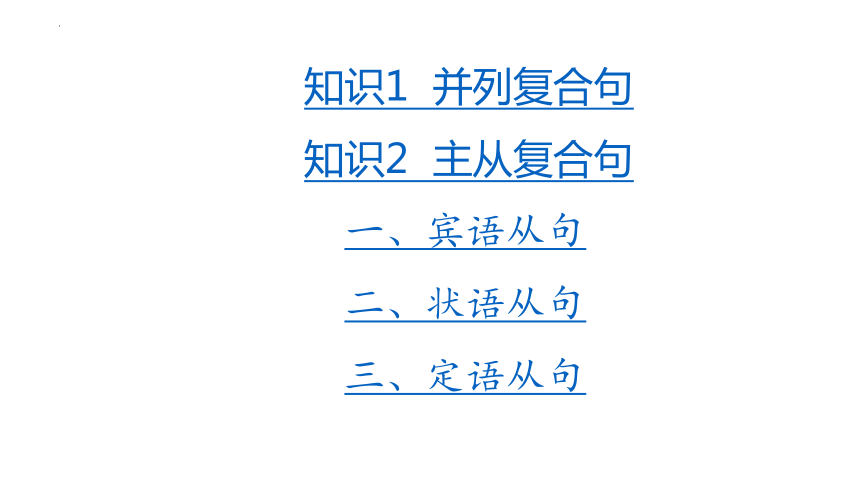
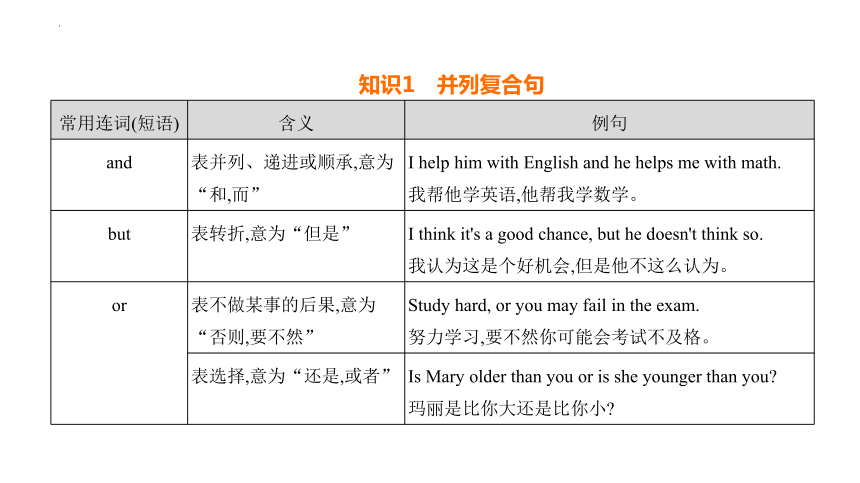
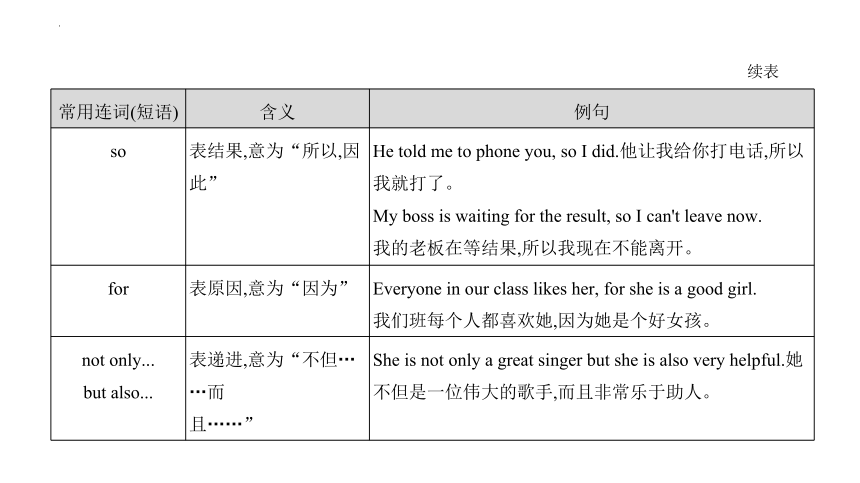
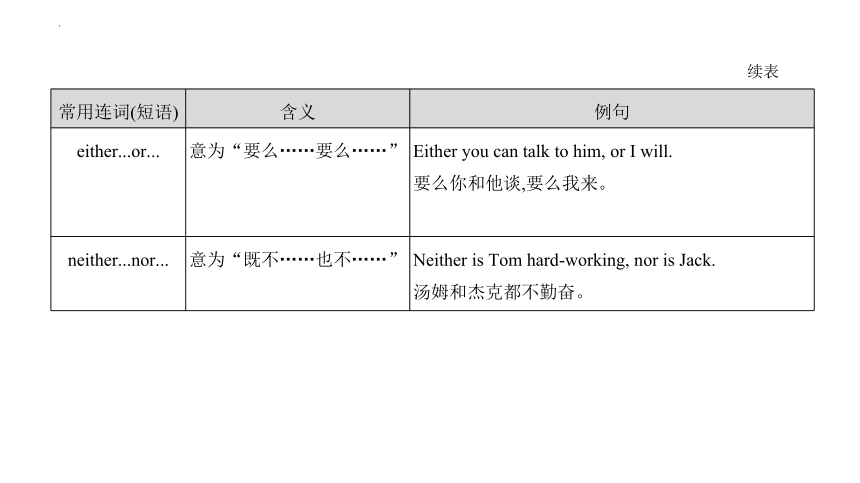
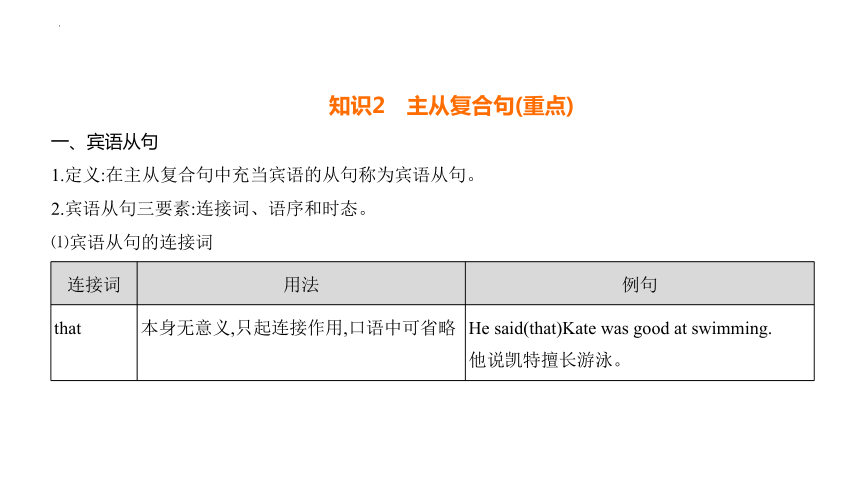
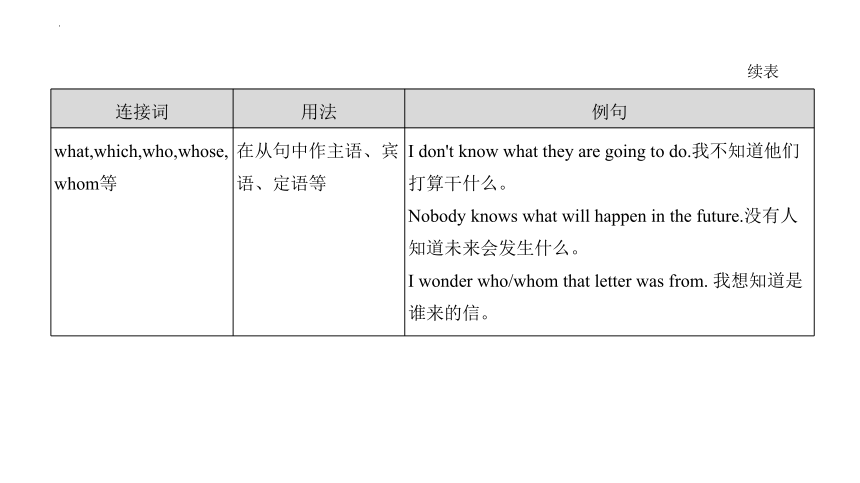
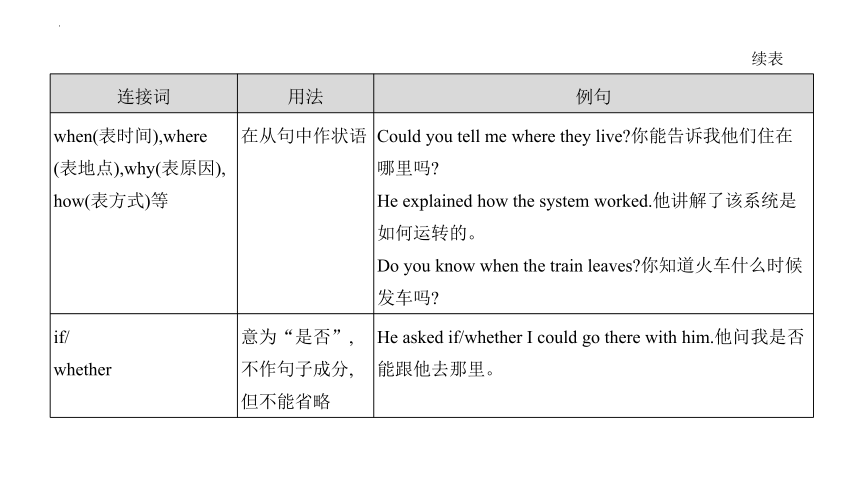

文档简介
(共26张PPT)
并列复合句和主从复合句
知识1 并列复合句
知识2 主从复合句
一、宾语从句
二、状语从句
三、定语从句
知识1 并列复合句
常用连词(短语) 含义 例句
and 表并列、递进或顺承,意为“和,而” I help him with English and he helps me with math.
我帮他学英语,他帮我学数学。
but 表转折,意为“但是” I think it's a good chance, but he doesn't think so.
我认为这是个好机会,但是他不这么认为。
or 表不做某事的后果,意为 “否则,要不然” Study hard, or you may fail in the exam.
努力学习,要不然你可能会考试不及格。
表选择,意为“还是,或者” Is Mary older than you or is she younger than you
玛丽是比你大还是比你小
常用连词(短语) 含义 例句
so 表结果,意为“所以,因此” He told me to phone you, so I did.他让我给你打电话,所以我就打了。
My boss is waiting for the result, so I can't leave now.
我的老板在等结果,所以我现在不能离开。
for 表原因,意为“因为” Everyone in our class likes her, for she is a good girl.
我们班每个人都喜欢她,因为她是个好女孩。
not only... but also... 表递进,意为“不但……而 且……” She is not only a great singer but she is also very helpful.她不但是一位伟大的歌手,而且非常乐于助人。
续表
常用连词(短语) 含义 例句
either...or... 意为“要么……要么……” Either you can talk to him, or I will.
要么你和他谈,要么我来。
neither...nor... 意为“既不……也不……” Neither is Tom hard-working, nor is Jack.
汤姆和杰克都不勤奋。
续表
知识2 主从复合句(重点)
一、宾语从句
1.定义:在主从复合句中充当宾语的从句称为宾语从句。
2.宾语从句三要素:连接词、语序和时态。
⑴宾语从句的连接词
连接词 用法 例句
that 本身无意义,只起连接作用,口语中可省略 He said(that)Kate was good at swimming.
他说凯特擅长游泳。
连接词 用法 例句
what,which,who,whose,whom等 在从句中作主语、宾语、定语等 I don't know what they are going to do.我不知道他们打算干什么。
Nobody knows what will happen in the future.没有人知道未来会发生什么。
I wonder who/whom that letter was from. 我想知道是谁来的信。
续表
连接词 用法 例句
when(表时间),where (表地点),why(表原因), how(表方式)等 在从句中作状语 Could you tell me where they live 你能告诉我他们住在哪里吗
He explained how the system worked.他讲解了该系统是如何运转的。
Do you know when the train leaves 你知道火车什么时候发车吗
if/ whether 意为“是否”,不作句子成分,但不能省略 He asked if/whether I could go there with him.他问我是否能跟他去那里。
续表
⑵宾语从句的语序必须是陈述句语序,即主语+谓语(+宾语)/主语+系动词+表语。如:
I wonder where he lives.我想知道他住在哪里。
I don't know if/whether he is right.
我不知道他是否正确。
⑶宾语从句的时态遵循三个原则:
①需要性原则:主句是现在时(包括一般现在时、现在进行时和现在完成时),从句时态由句意及时间
状语决定。如:
I want to know where he went just now.
我想知道他刚刚去哪儿了。
②呼应性原则:主句是过去时(包括一般过去时、过去进行时),从句用相应的过去的某种时态。如:
He said that he had finished the homework.
他说他已经完成了作业。
③特殊性原则:从句表述客观事实、普遍真理和自然现象,无论主句是什么时态,从句都用一般现在
时。如:
Our teacher told us that the earth goes around the sun.我们老师告诉我们地球绕着太阳转。
二、状语从句
在主从复合句中,作状语的从句叫做状语从句。状语从句根据其表达的意思可分为时间状语从
句、条件状语从句、原因状语从句、目的状语从句、结果状语从句、让步状语从句等。
从属连词 例句
when“当……的时候” I wasn't in when you called.你打电话时我不在家。
When I got home, my sister was doing her homework.
我到家时,我妹妹在做作业。
I was doing my homework when my mother was cooking.
妈妈做饭时,我在写作业。
while“当……的时候” While he was washing the car, Jenny was cooking
the dinner.当他在洗车的时候,珍妮在做晚饭。
1.时间状语从句
从属连词 例句
as“随着/当……时” He sat watching her as she got ready.他一直坐着看她准备妥当。
As time goes by, he is getting stronger and stronger.随着时间的推移,他变得越来越强壮了。
before/after “在……之前/之后” Before I got to the bus stop, the bus had already left.
我到达公交车站前,车已经离开了。
After I finished my homework, my mother came home.
在我完成作业后,妈妈到家了。
续表
从属连词 例句
since“自……以来” I have worked in this school since I graduated from Peking
University.从北京大学毕业后,我就在这所学校工作。
It is ten years since she began to learn English.
她学英语有十年了。
till/until“直到……为止”,not...until“直到……才……” I'll wait for you until/till you come to see me.
我会一直等到你来看我。
I didn't go to bed until I finished my homework.
直到做完作业,我才去睡觉。
续表
从属连词 例句
as soon as“一……就……” I'll ring you up as soon as I get to Beijing.
我一到北京就给你打电话。
As soon as he heard the little girl crying for help outside, he rushed
out from the room immediately.一听到小女孩在外面呼救,他就立刻从房间里冲了出去。
注意 描述未来事件时,在含有时间状语从句的主从复合句中,若主句是一般将来时,从句用一般现
在时,即“主将从现”。
续表
2.条件状语从句
从属连词 例句
if“如果” I'll visit the Great Wall if it doesn't rain tomorrow.
如果明天不下雨,我将去游览长城。
unless(=if...not)“如果不,除非” Unless he says sorry to me, I won't talk to him.=If he doesn't say sorry to me, I won't talk to him.他不给我道歉,我就不理他了。
as/so long as“只要” We'll go as long as the weather is good. 只要天气好我们就去。
3.原因状语从句
从属连词 例句
because“因为” I was late because I missed the school bus.我迟到是因为我错过校车了。
since“因为,既然” Since everyone is here, let's begin.既然人都到了,我们开始吧。
as“由于,鉴于” As I had a sore throat, I kept silent in class.由于咽喉痛,我上课保持沉默。
注意 在同一个句子中,because 和so不可同时使用,只能用其一。
误用示例:Because her parents died, so she had to make a living by herself.(要么删去Because,要么删去
so)
4.目的状语从句
从属连词 例句
so that“以便” He must get up early so that he can catch the first bus.
他必须早起,以便赶上首班公交车。
in order that “为了” He worked day and night in order that he could succeed.
他夜以继日地工作为的是取得成功。
5.结果状语从句
从属连词 用法 例句
so...that“如此……以至于” so修饰形容词或副词 She is so lovely that we all love her.
她如此可爱,以至于我们都喜欢她。
such...that “如此……以至于” such修饰名词 She is such a lovely girl that we all love her.她是一个如此可爱的女孩,以至于我们都喜欢她。
6.让步状语从句
引导让步状语从句的从属连词有though,although,even though/if(尽管/即使)等。如:
Although/Though Mike didn't win the race, he was still wearing a smile on his face.虽然迈克赛跑没有
赢,但是他仍然面带微笑。
注意 从属连词although、though和并列连词but 不可同时使用,只能用其一。
误用示例:Although the traffic was heavy, but we got to the railway station on time.(要么删去but,要么
删去Although)
三、定语从句
1.定义:在主从复合句中,修饰名词或代词的从句叫定语从句。定语从句通常置于它所修饰的名词
或代词之后,被修饰的名词或代词叫先行词。定语从句也叫关系从句。
2.构成:先行词+关系词+定语从句
3.关系词分为关系代词(that、which、who、whom等)和关系副词(when、where、why)。初中阶段
主要掌握由关系代词that、who、which引导的定语从句。关系代词在从句中作宾语时常可省略。
关系代词 指代对象 例句
that在从句中 作主语或宾语 指物 I like apples that are red.(作主语)我喜欢红色的苹果。
You can choose anything (that) you like.(作宾语)你可以选择任
何你喜欢的东西。
I like music (that) I can dance to.(作介词宾语)我喜欢可以跟着跳舞的音乐。
关系代词 指代对象 例句
that在从句中 作主语或宾语 指人 Who is the man that is reading a newspaper over there (作主语)
正在那边读报纸的那个人是谁
The girl (that) we saw yesterday was Tom's sister.(作宾语)我们昨天看到的那个女孩是汤姆的姐姐。
That's the man (that) you are looking for.(作介词宾语)那就是你正找的那个人。
which在从句中 作主语或宾语 指物 I love the books which were writ-ten by Lu Xun.(作主语)我喜欢鲁迅写的书。
The story (which) he told was very popular.(作宾语)他讲的那个故事很受欢迎。
续表
关系代词 指代对象 例句
who在从句中 作主语或宾语, whom在从句中作宾语 指人 I love the singers who sing words clearly.(作主语)我喜欢那些唱
歌吐字清晰的歌手。
A friend is someone who always helps you when you are in trouble.(作主语) 朋友是在你陷入困境时总是帮助你的人。
Mrs. Jones is the person who/whom you should wait for.(作介词宾语)琼斯太太就是那个你应该等的人。
续表
即时训练
1.There are more cars on the street, we can't be too careful when crossing the street.
A.but B.so C.or D.because
2. —What did the foreigner say to you just now
—He asked me .
A.if I have ever heard of Beijing Opera
B.why did I like Beijing Opera
C.that Beijing Opera had strong local colour
D.if Beijing Opera had lasting value
B
D
3.When you get angry, don't shout at others. You can go to talk with them you calm down.
A.since B.although C.before D.after
4.You know our society needs talent with different kinds of skills. So we must learn them
we can live a better life when we grow up.
A.so that B.as soon as C.even though D.because of
5.We should take the rest of the food home we can't finish what we order.
A.if B.so C.unless D.until
D
A
A
6.—The local food may taste a bit strange.
—Well, we are here, why not give it a try
A.though B.unless C.since D.before
7.She was angry at what he did she left without a word.
A.so;to B.so;that C.such; to D.such;that
8.The earth is the only planet provides us with everything we need, fresh air, clean water and
so on.
A.who B.what C.that D.whom
C
B
C
并列复合句和主从复合句
知识1 并列复合句
知识2 主从复合句
一、宾语从句
二、状语从句
三、定语从句
知识1 并列复合句
常用连词(短语) 含义 例句
and 表并列、递进或顺承,意为“和,而” I help him with English and he helps me with math.
我帮他学英语,他帮我学数学。
but 表转折,意为“但是” I think it's a good chance, but he doesn't think so.
我认为这是个好机会,但是他不这么认为。
or 表不做某事的后果,意为 “否则,要不然” Study hard, or you may fail in the exam.
努力学习,要不然你可能会考试不及格。
表选择,意为“还是,或者” Is Mary older than you or is she younger than you
玛丽是比你大还是比你小
常用连词(短语) 含义 例句
so 表结果,意为“所以,因此” He told me to phone you, so I did.他让我给你打电话,所以我就打了。
My boss is waiting for the result, so I can't leave now.
我的老板在等结果,所以我现在不能离开。
for 表原因,意为“因为” Everyone in our class likes her, for she is a good girl.
我们班每个人都喜欢她,因为她是个好女孩。
not only... but also... 表递进,意为“不但……而 且……” She is not only a great singer but she is also very helpful.她不但是一位伟大的歌手,而且非常乐于助人。
续表
常用连词(短语) 含义 例句
either...or... 意为“要么……要么……” Either you can talk to him, or I will.
要么你和他谈,要么我来。
neither...nor... 意为“既不……也不……” Neither is Tom hard-working, nor is Jack.
汤姆和杰克都不勤奋。
续表
知识2 主从复合句(重点)
一、宾语从句
1.定义:在主从复合句中充当宾语的从句称为宾语从句。
2.宾语从句三要素:连接词、语序和时态。
⑴宾语从句的连接词
连接词 用法 例句
that 本身无意义,只起连接作用,口语中可省略 He said(that)Kate was good at swimming.
他说凯特擅长游泳。
连接词 用法 例句
what,which,who,whose,whom等 在从句中作主语、宾语、定语等 I don't know what they are going to do.我不知道他们打算干什么。
Nobody knows what will happen in the future.没有人知道未来会发生什么。
I wonder who/whom that letter was from. 我想知道是谁来的信。
续表
连接词 用法 例句
when(表时间),where (表地点),why(表原因), how(表方式)等 在从句中作状语 Could you tell me where they live 你能告诉我他们住在哪里吗
He explained how the system worked.他讲解了该系统是如何运转的。
Do you know when the train leaves 你知道火车什么时候发车吗
if/ whether 意为“是否”,不作句子成分,但不能省略 He asked if/whether I could go there with him.他问我是否能跟他去那里。
续表
⑵宾语从句的语序必须是陈述句语序,即主语+谓语(+宾语)/主语+系动词+表语。如:
I wonder where he lives.我想知道他住在哪里。
I don't know if/whether he is right.
我不知道他是否正确。
⑶宾语从句的时态遵循三个原则:
①需要性原则:主句是现在时(包括一般现在时、现在进行时和现在完成时),从句时态由句意及时间
状语决定。如:
I want to know where he went just now.
我想知道他刚刚去哪儿了。
②呼应性原则:主句是过去时(包括一般过去时、过去进行时),从句用相应的过去的某种时态。如:
He said that he had finished the homework.
他说他已经完成了作业。
③特殊性原则:从句表述客观事实、普遍真理和自然现象,无论主句是什么时态,从句都用一般现在
时。如:
Our teacher told us that the earth goes around the sun.我们老师告诉我们地球绕着太阳转。
二、状语从句
在主从复合句中,作状语的从句叫做状语从句。状语从句根据其表达的意思可分为时间状语从
句、条件状语从句、原因状语从句、目的状语从句、结果状语从句、让步状语从句等。
从属连词 例句
when“当……的时候” I wasn't in when you called.你打电话时我不在家。
When I got home, my sister was doing her homework.
我到家时,我妹妹在做作业。
I was doing my homework when my mother was cooking.
妈妈做饭时,我在写作业。
while“当……的时候” While he was washing the car, Jenny was cooking
the dinner.当他在洗车的时候,珍妮在做晚饭。
1.时间状语从句
从属连词 例句
as“随着/当……时” He sat watching her as she got ready.他一直坐着看她准备妥当。
As time goes by, he is getting stronger and stronger.随着时间的推移,他变得越来越强壮了。
before/after “在……之前/之后” Before I got to the bus stop, the bus had already left.
我到达公交车站前,车已经离开了。
After I finished my homework, my mother came home.
在我完成作业后,妈妈到家了。
续表
从属连词 例句
since“自……以来” I have worked in this school since I graduated from Peking
University.从北京大学毕业后,我就在这所学校工作。
It is ten years since she began to learn English.
她学英语有十年了。
till/until“直到……为止”,not...until“直到……才……” I'll wait for you until/till you come to see me.
我会一直等到你来看我。
I didn't go to bed until I finished my homework.
直到做完作业,我才去睡觉。
续表
从属连词 例句
as soon as“一……就……” I'll ring you up as soon as I get to Beijing.
我一到北京就给你打电话。
As soon as he heard the little girl crying for help outside, he rushed
out from the room immediately.一听到小女孩在外面呼救,他就立刻从房间里冲了出去。
注意 描述未来事件时,在含有时间状语从句的主从复合句中,若主句是一般将来时,从句用一般现
在时,即“主将从现”。
续表
2.条件状语从句
从属连词 例句
if“如果” I'll visit the Great Wall if it doesn't rain tomorrow.
如果明天不下雨,我将去游览长城。
unless(=if...not)“如果不,除非” Unless he says sorry to me, I won't talk to him.=If he doesn't say sorry to me, I won't talk to him.他不给我道歉,我就不理他了。
as/so long as“只要” We'll go as long as the weather is good. 只要天气好我们就去。
3.原因状语从句
从属连词 例句
because“因为” I was late because I missed the school bus.我迟到是因为我错过校车了。
since“因为,既然” Since everyone is here, let's begin.既然人都到了,我们开始吧。
as“由于,鉴于” As I had a sore throat, I kept silent in class.由于咽喉痛,我上课保持沉默。
注意 在同一个句子中,because 和so不可同时使用,只能用其一。
误用示例:Because her parents died, so she had to make a living by herself.(要么删去Because,要么删去
so)
4.目的状语从句
从属连词 例句
so that“以便” He must get up early so that he can catch the first bus.
他必须早起,以便赶上首班公交车。
in order that “为了” He worked day and night in order that he could succeed.
他夜以继日地工作为的是取得成功。
5.结果状语从句
从属连词 用法 例句
so...that“如此……以至于” so修饰形容词或副词 She is so lovely that we all love her.
她如此可爱,以至于我们都喜欢她。
such...that “如此……以至于” such修饰名词 She is such a lovely girl that we all love her.她是一个如此可爱的女孩,以至于我们都喜欢她。
6.让步状语从句
引导让步状语从句的从属连词有though,although,even though/if(尽管/即使)等。如:
Although/Though Mike didn't win the race, he was still wearing a smile on his face.虽然迈克赛跑没有
赢,但是他仍然面带微笑。
注意 从属连词although、though和并列连词but 不可同时使用,只能用其一。
误用示例:Although the traffic was heavy, but we got to the railway station on time.(要么删去but,要么
删去Although)
三、定语从句
1.定义:在主从复合句中,修饰名词或代词的从句叫定语从句。定语从句通常置于它所修饰的名词
或代词之后,被修饰的名词或代词叫先行词。定语从句也叫关系从句。
2.构成:先行词+关系词+定语从句
3.关系词分为关系代词(that、which、who、whom等)和关系副词(when、where、why)。初中阶段
主要掌握由关系代词that、who、which引导的定语从句。关系代词在从句中作宾语时常可省略。
关系代词 指代对象 例句
that在从句中 作主语或宾语 指物 I like apples that are red.(作主语)我喜欢红色的苹果。
You can choose anything (that) you like.(作宾语)你可以选择任
何你喜欢的东西。
I like music (that) I can dance to.(作介词宾语)我喜欢可以跟着跳舞的音乐。
关系代词 指代对象 例句
that在从句中 作主语或宾语 指人 Who is the man that is reading a newspaper over there (作主语)
正在那边读报纸的那个人是谁
The girl (that) we saw yesterday was Tom's sister.(作宾语)我们昨天看到的那个女孩是汤姆的姐姐。
That's the man (that) you are looking for.(作介词宾语)那就是你正找的那个人。
which在从句中 作主语或宾语 指物 I love the books which were writ-ten by Lu Xun.(作主语)我喜欢鲁迅写的书。
The story (which) he told was very popular.(作宾语)他讲的那个故事很受欢迎。
续表
关系代词 指代对象 例句
who在从句中 作主语或宾语, whom在从句中作宾语 指人 I love the singers who sing words clearly.(作主语)我喜欢那些唱
歌吐字清晰的歌手。
A friend is someone who always helps you when you are in trouble.(作主语) 朋友是在你陷入困境时总是帮助你的人。
Mrs. Jones is the person who/whom you should wait for.(作介词宾语)琼斯太太就是那个你应该等的人。
续表
即时训练
1.There are more cars on the street, we can't be too careful when crossing the street.
A.but B.so C.or D.because
2. —What did the foreigner say to you just now
—He asked me .
A.if I have ever heard of Beijing Opera
B.why did I like Beijing Opera
C.that Beijing Opera had strong local colour
D.if Beijing Opera had lasting value
B
D
3.When you get angry, don't shout at others. You can go to talk with them you calm down.
A.since B.although C.before D.after
4.You know our society needs talent with different kinds of skills. So we must learn them
we can live a better life when we grow up.
A.so that B.as soon as C.even though D.because of
5.We should take the rest of the food home we can't finish what we order.
A.if B.so C.unless D.until
D
A
A
6.—The local food may taste a bit strange.
—Well, we are here, why not give it a try
A.though B.unless C.since D.before
7.She was angry at what he did she left without a word.
A.so;to B.so;that C.such; to D.such;that
8.The earth is the only planet provides us with everything we need, fresh air, clean water and
so on.
A.who B.what C.that D.whom
C
B
C
同课章节目录
- 词法
- 名词
- 动词和动词短语
- 动词语态
- 动词时态
- 助动词和情态动词
- 非谓语动词
- 冠词
- 代词
- 数词和量词
- 形容词副词及其比较等级
- 介词和介词短语
- 连词和感叹词
- 构词法
- 相似、相近词比较
- 句法
- 陈述句
- 一般疑问句和否定疑问句
- 特殊疑问句及选择疑问句
- 反意疑问句
- 存在句(There be句型)
- 宾语从句
- 定语从句
- 状语从句
- 主谓一致问题
- 简单句
- 并列句
- 复合句
- 主谓一致
- 主、表语从句
- 名词性从句
- 直接引语和间接引语
- 虚拟语气
- 感叹句
- 强调句
- 倒装句
- 祈使句
- 句子的成分
- 句子的分类
- 题型专区
- 单项选择部分
- 易错题
- 完形填空
- 阅读理解
- 词汇练习
- 听说训练
- 句型转换
- 补全对话
- 短文改错
- 翻译
- 书面表达
- 任务型阅读
- 语法填空
- 其他资料
